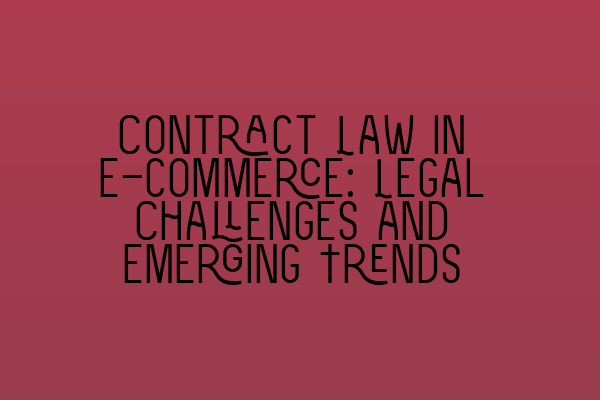Contract Law in E-commerce: Legal Challenges and Emerging Trends
In today’s digital age, e-commerce has revolutionized the way businesses operate and consumers shop. With just a few clicks, customers can purchase goods and services from anywhere in the world. However, this convenience also brings significant legal challenges that must be navigated to ensure a fair and secure online marketplace. In this article, we will explore the key legal considerations in contract law for e-commerce businesses, along with emerging trends that are reshaping this dynamic arena.
1. Formation of Contracts in E-commerce
The first crucial aspect of contract law in e-commerce is the formation of contracts. Unlike traditional face-to-face transactions, online contracts require specific elements to be enforceable. These elements include offer, acceptance, consideration, and intention to create legal relations. E-commerce businesses must ensure that their online platforms clearly communicate these elements to users during the purchasing process. This includes displaying the terms and conditions of the contract and obtaining users’ explicit acceptance.
To further understand the formation of contracts in e-commerce, it is beneficial to have a strong grasp of the fundamental principles. You can strengthen your knowledge by practicing SQE 1 exam questions related to contract law and familiarize yourself with contract formation scenarios by attempting SQE 1 practice mocks.
2. Consumer Protection and Distance Selling Regulations
Consumer protection is a paramount concern in e-commerce. The law provides specific rights and remedies to protect consumers when buying goods and services online. E-commerce businesses must comply with distance selling regulations, which ensure transparency, fairness, and trust in consumer transactions. These regulations cover various aspects, including the provision of pre-contractual information, the right to cancel an order, and the seller’s obligations in terms of delivery and quality of goods.
To dive deeper into consumer protection laws and regulations, consider enrolling in SQE 2 preparation courses or SQE 1 preparation courses. These courses will equip you with a comprehensive understanding of consumer rights and how they intersect with contract law in e-commerce.
3. Electronic Signatures and Authentication
In an era where physical signatures are often impractical, electronic signatures have gained significant recognition and acceptance in contract law. The use of electronic signatures streamlines the process of contract formation in e-commerce. However, it is essential to understand the legal requirements for electronic signatures to ensure their validity and enforceability.
4. Data Protection and Privacy
Data protection and privacy are critical considerations in e-commerce. Online businesses collect and store a vast amount of customer data, including personal information and transaction records. Compliance with data protection laws, such as the General Data Protection Regulation (GDPR), is essential to protect users’ privacy rights and avoid legal consequences. E-commerce businesses must establish robust data protection policies, obtain user consent for data collection and processing, and implement appropriate security measures to safeguard customer information.
5. International and Cross-border Transactions
With the global nature of e-commerce, cross-border transactions are becoming increasingly common. International contracts present unique legal challenges, including differing laws, jurisdictional issues, and dispute resolution mechanisms. E-commerce businesses must be aware of these challenges and, if necessary, seek legal advice to ensure compliance with various legal frameworks and avoid potential conflicts.
As you embark on your journey to become proficient in contract law for e-commerce, it is crucial to stay updated with the latest SRA SQE exam dates. Familiarizing yourself with these dates will enable you to plan your studies effectively and align your learning with the examination schedule.
In conclusion, contract law in e-commerce is a complex and evolving field with its fair share of legal challenges. From contract formation to consumer protection, electronic signatures to data protection, and international transactions, e-commerce businesses must navigate these legal considerations to foster trust and confidence in the online marketplace. By staying knowledgeable and continuously adapting to emerging trends, e-commerce businesses can strive for legal compliance and a seamless customer experience.
Related Articles:
– Practice SQE 1 Exam Questions: Enhance your understanding of contract law by attempting SQE 1 practice exam questions.
– SQE 1 Practice Mocks FLK1 FLK2: Test your contract law knowledge by practicing SQE 1 mock exams designed to simulate the real examination experience.
– SQE 2 Preparation Courses: Explore SQE 2 preparation courses that cover contract law and other relevant subjects to excel in the SQE 2 examination.
– SQE 1 Preparation Courses: Enroll in SQE 1 preparation courses to strengthen your understanding of contract law and other foundational legal principles.
– SRA SQE Exam Dates: Stay informed about the upcoming SRA SQE examination dates to plan your studies effectively and maximize your chances of success.
